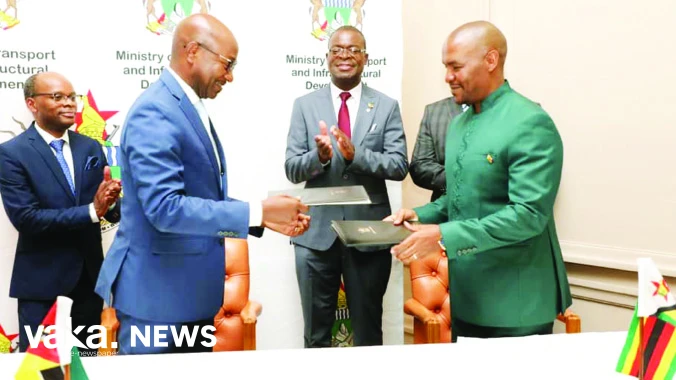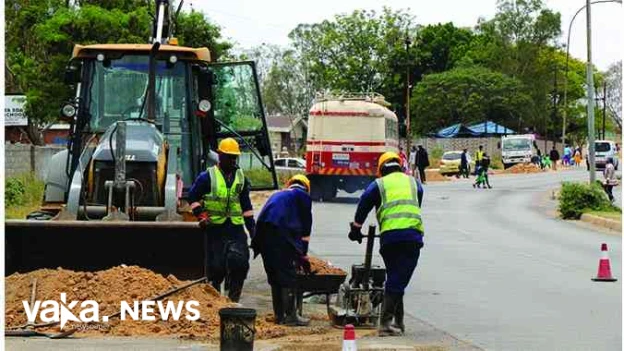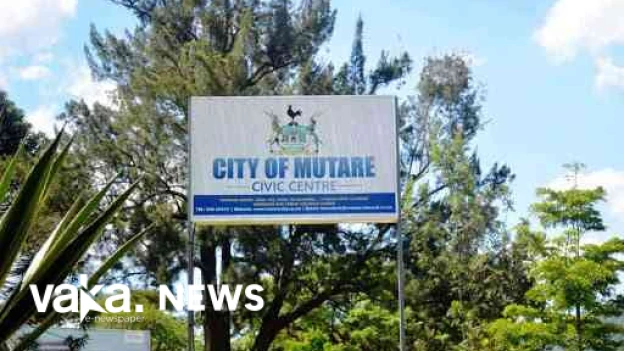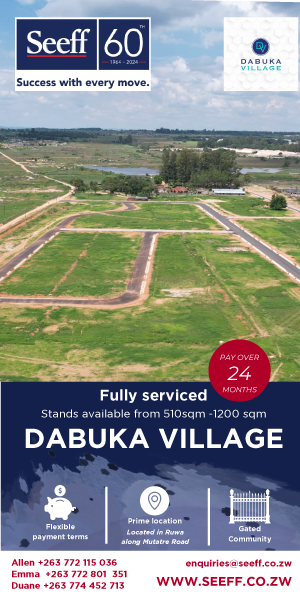Zim commits to building, upgrading more roads
- Category: Construction

- By Admin
Transport and Infrastructural Development Minister Felix Mhona (right) exchanges documents with Mozambique Minister of Transport and Communication Mr Mateus Magala after signing a MOU in the presence Higher and Tertiary Education, Innovation, Science and Technology Development Amon Murwira in Harare, yesterday
Zimbabwe is committed to building more and better roads, bridges, airports, railway networks and border crossing facilities but cannot do it alone and thus needed to be in partnership with neighbours such as Mozambique.
Transport and Infrastructural Development Minister Felix Mhona said cooperation between the two countries was not new because it was anchored by a historical and strong foundation of having shared the same trenches in the struggle for independence against colonialism during yesterday's bilateral meeting between Zimbabwe and Mozambique on cooperation in transport and transport infrastructure in Harare.
"That in and of itself is evidence of our lasting heritage of bilateral cooperation toward mutually advantageous and people-development initiatives. Indeed, there are many similarities between our two nations—geography, customs, values, cultures, languages, religion, aspirations, and interests—that make us particularly linked to one another.
"Remember that this bilateral platform is an opportunity to expand our cooperation in the transportation and infrastructure sectors, including aviation, road, rail, and maritime.
As a catalyst for better ties between us, let's strengthen people-to-people ties and increase government-to-government cooperation through this partnership. We must keep up this momentum and ground game because these relationships help us handle problems of shared concern in a way that meets our needs and expectations.
"I would also want to convey my sincere appreciation and recognition to our two inspiring heads of state: Cde FJ Nyusi, President of the Republic of Mozambique, and Cde Dr. ED Mnangagwa, President of the Republic of Zimbabwe. For the benefit of our two nations and peoples, they have led us to establish connections.
In order to reduce the expensive and time-consuming transshipment of people and goods, he said, "as you have heard during your deliberations, our Heads of State agreed on the need for deeper cooperation in the transport sector to facilitate the development of infrastructure and seamless transit facilitation."
He knew that they had been navigating a complicated agenda for the previous two days, discussing a wide range of topics related to transportation, infrastructure, and development, mostly concerning the Beira Development Corridor.
"These conversations elevate our hopes and fortify our commitment to a Southern African region that is interconnected in the context of a continental renaissance. This is boldly demonstrated by the African Continental Free Trade Area (AfCTA), the world's largest free trade area that aims to capitalize on an extensive logistics and transport network.
We should be able to access the yearly influxes of foreign direct investment from the international financial institutions and other development financing sources thanks to our bilateral relationship with Mozambique. Africa is the continent with the fastest population growth, and its people are moving around the continent more quickly than those of any other.
"These trends will lead to unprecedented demand and opportunities for massive logistical arrangements, fast mobilizations, and connectivity." For our region to thrive, investments in transportation infrastructure, such as roads and railroads, are essential.
"Given the current surge in the export of bulky minerals such as coal, iron ore, ferrochrome, granite, lithium, and chrome ore, as well as the influx of containers, grains, fertilizer, and containerized traffic, it's imperative that we step up our game and work together to jointly access development finance to expand our infrastructure," Minister Mhona stated.
Corridors for joint transport development were essential to the integration of Africa. The creation of the Organization of African Unity, the precursor to the African Union, in 1963 marked the beginning of the Pan-African effort for the unified economic development of the African continent, according to Minister Mhona.
As Zimbabwe and Mozambique are demonstrating today, Africa has been on the track of economic progress since then by opening up new areas of cooperation. In order to guarantee that African people's objectives are realized, it thus demands for increased cooperation and support for projects headed by Africans.
"The goals and plans outlined in Agenda 2063 align with the cooperation that exists between Mozambique and Zimbabwe."
The timing of this summit is ideal, as the two sister nations work to create resilient transportation systems that will guarantee more physical connectivity than in the past. Zimbabwe is dedicated to constructing larger and better airports, railway networks, highways, bridges, and facilities for crossing borders. However, we can't accomplish it by ourselves. Every step of the way, you are essential to us," he remarked.
According to Minister Mhona, there is still a great deal of space for development in cooperative partnerships.
Given the scope of the job ahead of us and the reflections that our teams have had over the last two days, we must therefore do more if we are to make significant progress. I therefore want to strongly advise everyone that more work needs to be done on all of the agreed-upon action items in order to effectively realize our goals. This work should begin with formalizing protocols and bilateral arrangements as well as setting up systems and mechanisms for implementation, monitoring, evaluation, and follow-ups.
Understanding that Mozambique serves as a vital transit route for land-locked nations like Zimbabwe, Zambia, Malawi, and the Democratic Republic of the Congo is crucial. Major imports and exports from these nations are dependent on the ports of Maputo and Beira. Thus, it is essential that we foster collaboration and enable smooth movements between the Republics of Zimbabwe and Mozambique as well as other sister nations, the speaker stated.
The competitiveness of their aviation industry was greatly increased by regional aviation cooperation.
"I am happy that Zimbabwe and Mozambique's bilateral air service agreement now complies with the Yamoussoukro Decision, which calls for a liberalized air transport market. In this context, I would want to use this occasion to thank Mozambique for enabling essential aviation connections via LAM Mozambique Airlines.
As you are now aware, the Zimbabwean government has made significant investments in the modernization of airports throughout the nation; as a result, my team in the aviation industry will put in endless effort to enhance the current air connectivity.
“In line with the International Civil Aviation Organisation recommended standards and practices for aviation safety, we shall be signing an MOU on aircraft accident and incidence investigation.
Of late, we demonstrated that we can collaborate in the aviation sector when we signed the bilateral aeronautical search and rescue agreement. I urge our departments, agencies and public entities under the purviews of our Transport Ministries to implement these agreements.
“I am also aware that in terms of Article 5 of the existing MOU in Transport cooperation between Zimbabwe and Mozambique, we should periodically meet on a bilateral basis, to review our progress in joint transport infrastructure projects. Let us implement legal instruments which we sign,” Minister Mhona said.
Contact Us
Editorial: dion@vaka.co.zw
Advertising: advertising@vaka.co.zw
: news@vaka.co.zw
Whatsapp: +263787980064






